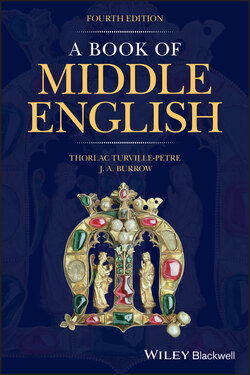Читать книгу A Book of Middle English - J. A. Burrow - Страница 94
8.1 Trevisa’s Dialogue
ОглавлениеJohn Trevisa, chaplain at Berkeley Castle, translated three major Latin works at the command of his master Lord Berkeley. In his Dialogue between a Lord and a Clerk (text 12), the preface to his translation of Higden’s Polychronicon, Trevisa imagines a conversation that raises fundamental issues about translation. The most basic of these is, what is the point of a translation? To answer this involves asking whom it is for. Because there are so many mutually incomprehensible languages, argues the Clerk, important works have been written in Latin, a lingua franca that scholars all over Europe understand; therefore there is no need to translate the Latin into English. Those who only understand English should learn Latin if they want to read the Polychronicon and other chronicles. The Lord points out that not everyone who would want to understand Latin works can read Latin easily, and not everyone has the opportunity to learn it. Citing the precedents of biblical translations from Hebrew to Greek and Greek to Latin, he argues that preachers give sermons on the Bible in English to those who do not know Latin. ‘Such Englysch prechyng ys verrey Englysch translacion, and such Englysch prechyng ys good and neodful; þanne Englysch translacion ys good and neodful’ (12/131–4). The Clerk raises a final objection, which is a strong one: that a translation risks misrepresenting the original. Conceding this point, the Lord explains that he does not demand a faultless work, ‘bote ich wolde have a skylfol translacion þat myʒt be knowe and understonde’ (12/143–4). The Clerk, accepting his brief, asks whether his translation should be in verse or prose. It may seem odd to envisage a translation of a Latin prose chronicle into verse, but that was an option for writers who wished to entertain as well as inform, with notable examples such as The Wars of Alexander. But the Lord asks for prose, since ‘prose ys more cleer þan ryme, more esy and more playn to knowe and understonde’ (12/147–8).
Trevisa thus makes the point that there is no one right way to make a translation: the nature of the translation must depend upon its purpose and the nature of the readership. A translation may be in prose or in verse; thus it may be more or less literal (but what does a ‘literal’ translation consist of?); there is no such thing as a perfect translation, for a text cannot be transposed intact from one language into another.
